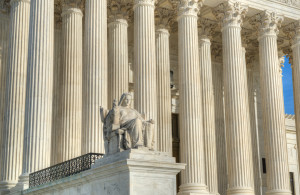Perez v. Mortage Bankers Association: APA Compliance

What you need to know about Perez v. Mortgage Bankers Association
In Perez v. Mortgage Bankers Association, 135 S.Ct. 1199 (2015), the U.S. Supreme Court held that federal agencies do not have to follow the “notice-and-comment” procedures of the Administrative Procedures Act (APA) when they substantially alter the interpretations of their own regulations. In so ruling, the unanimous Court largely dismissed concerns that condoning the practice would allow federal agencies to arbitrarily make legislative policy under the pretext of interpretive rules.
The Legal Background of Perez v. Mortgage Bankers Association
The APA generally provides that “notice of proposed rulemaking shall be published in the Federal Register,” and, if such notice is required, the rulemaking agency must give interested persons an opportunity to submit written comments. Section 4, however, provides that this notice-and-comment requirement “does not apply” to “interpretative rules, general statements of policy, or rules of agency organization, procedure, or practice.”
The Facts of Perez v. Mortgage Bankers Association
The case concerned the Department of Labor’s position regarding whether mortgage-loan officers qualify for the administrative exemption to overtime pay requirements under the Fair Labor Standards Act (FLSA). In 2006, the DOL’s Wage and Hour Division issued an opinion letter finding that mortgage-loan officers fell within the administrative exemption. In 2010, the agency altered its interpretation of the administrative exemption. Without notice or an opportunity for comment, the Department withdrew the 2006 opinion letter and issued an Administrator’s Interpretation concluding that mortgage-loan officers do not qualify for the administrative exemption.
The Mortgage Bankers Association (MBA) filed suit. It alleged that the 2010 interpretation was procedurally invalid under the D. C. Circuit’s decision in Paralyzed Veterans of Am. v. D. C. Arena L.P., 117 F. 3d 579, in which the court held that an agency must use the APA’s notice-and-comment procedures when it wishes to issue a new interpretation of a regulation that deviates significantly from a previously adopted interpretation.
The Court of Appeals for the District of Columbia ruled in favor of the Mortgage Bankers Association. Citing Paralyzed Veterans, it held that “[w]hen an agency has given its regulation a definitive interpretation, and later significantly revises that interpretation, the agency has in effect amended its rule, something it may not accomplish [under the APA] without [the due process requirement of] notice and comment.”
The Supreme Court’s Decision
The U.S. Supreme Court reversed. It held that the Paralyzed Veterans doctrine is contrary to the clear text of the APA’s rulemaking provisions and improperly imposes on agencies an obligation beyond the APA’s maximum procedural requirements.
Justice Sonia Sotomayor wrote the opinion, which held that the APA’s categorical exemption of interpretive rules from the notice-and-comment process was fatal to the Paralyzed Veterans doctrine. As Justice Sotomayor further explained, “Because an agency is not required to use notice-and-comment procedures to issue an initial interpretive rule, it is also not required to use those procedures to amend or repeal that rule.”
In a separate concurring opinion, Justices Antonin Scalia, Clarence Thomas and Samuel Alito Jr. noted that the D.C. Circuit’s decision was likely influenced by an “understandable concern about the aggrandizement of the power of administrative agencies.” They also raised concerns about the ramifications of the Court’s decision in light of the Court’s prior ruling in Bowles v. Seminole Rock & Sand Co., under which courts must defer to an agency’s interpretation of its own ambiguous regulations. “Agencies may now use these rules not just to advise the public, but also to bind them,” Justice Scalia acknowledged. “Interpretive rules that command deference do have the force of law.
Previous Articles
SCOTUS Decision in Bowe v. United States Is First of the 2026 Term
by DONALD SCARINCI on February 5, 2026
In Bowe v. United States, 607 U.S. ___ (2026), the U.S. Supreme Court held that Title 28 U.S.C. § ...
SCOTUS Rules State Can’t Immunize Parties from Federal Civil Liability
by DONALD SCARINCI on January 29, 2026
In John Doe v. Dynamic Physical Therapy, LLC, 607 U.S. ____ (2025) the U.S. Supreme Court held that...
Supreme Court to Address Racial Discrimination in Jury Selection
by DONALD SCARINCI onWhile the U.S. Supreme Court has concluded oral arguments for the year, it continues to add cases t...
The Amendments
-
Amendment1
- Establishment ClauseFree Exercise Clause
- Freedom of Speech
- Freedoms of Press
- Freedom of Assembly, and Petitition
-
Amendment2
- The Right to Bear Arms
-
Amendment4
- Unreasonable Searches and Seizures
-
Amendment5
- Due Process
- Eminent Domain
- Rights of Criminal Defendants
Preamble to the Bill of Rights
Congress of the United States begun and held at the City of New-York, on Wednesday the fourth of March, one thousand seven hundred and eighty nine.
THE Conventions of a number of the States, having at the time of their adopting the Constitution, expressed a desire, in order to prevent misconstruction or abuse of its powers, that further declaratory and restrictive clauses should be added: And as extending the ground of public confidence in the Government, will best ensure the beneficent ends of its institution.





